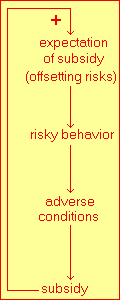| Frequently, subsidies are extended to persons or organizations in adverse conditions, to be suspended only if such conditions cease. In many cases, those negative conditions may be caused or at least influenced by certain kinds of actions of the victims—i. e., "risky" behavior. The expectation of compensating subsidies tends to decrease the disutility associated with those risks, thereby leading to recurrence or intensification of the undesirable circumstances in question. The resulting "vicious circle" or positive-feedback loop (see diagram) is further exacerbated if authorities respond to the growing "epidemic" by expanding the original subsidy program.
- For instance, tax-financed corporate bail-outs tend to encourage companies to make overly risky decisions. In the free market, of course, private investors sometimes find it worthwhile to aid a company tottering on the edge of bankruptcy; however, they must first evaluate the risks, comparing them against expected benefits in order to make a rational decision. Government officials, in contrast, are not guided by a profit motive; hence their subsidies and guaranteed loans are not generally supported by such rational calculation. Typically, in fact, the recipients are precisely those businesses adjudged poor risks by the market.
 |
|

|

